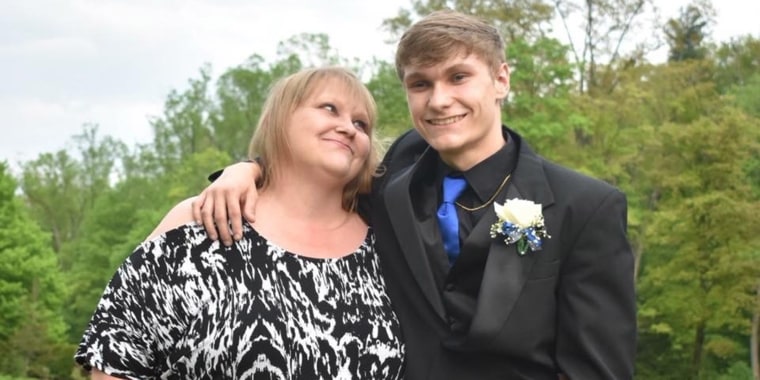Logan Lewis spent his entire life avoiding milk. Born with a severe milk allergy, he was taught from an early age to be vigilant about everything he ate and drank to prevent going into shock.
One mistake cost him his life.
The 20-year-old student from Ohio died this month when he accidentally drank something that contained milk at his college and couldn’t get to his EpiPen in time to stop his airways from closing, his mother announced on Facebook.
Jamie Lewis is speaking out about his death in hopes of saving others with similar life-threatening allergies.
“If I can prevent this from happening to even one other person, then that’s in honor of my boy,” Lewis, 43, told TODAY.
“What I want people — young, old, whatever age — to know is: Tell people you have an allergy and wear that medical ID bracelet because that may be what saves your life.”
She’s also calling on insurance companies to cover smaller, more portable and user-friendly epinephrine injectors that can fit inside a pocket.
“Boys and men tend to put everything in their pockets. Well, you can’t put an EpiPen in your pocket. It wouldn’t stay, you couldn’t sit down, you would lose it,” Lewis said.
'He was very aware'
The family found out Logan was allergic to milk right after he was born. Lewis couldn’t breastfeed and Logan had an immediate reaction to the milk formula, breaking out in hives and going into anaphylaxis, a potentially life-threatening reaction that impacts breathing. He thrived when he was switched to soy formula.
Milk is one of the most common food allergens, with 2-3% of children younger than 3 allergic to it, according to the American College of Allergy, Asthma & Immunology. About 80% of kids outgrow their condition before they’re 16, but Logan’s allergy continued to be “very, very severe,” his mother said.
As he was growing up, the family was supremely careful about checking ingredients and selecting his foods. When he started school, Lewis supplied all of his meals and Logan packed his lunch every day all the way through high school. When he went away to camp, the staff supplied a separate refrigerator that stored his milk-free breakfast, lunch, dinner, snacks and drinks for him for the entire week.
“It was something I was always on top of and as soon as he was old enough to understand, we educated him as well: Don’t accept things from other kids, don’t eat anything without talking to someone first,” Lewis recalled. “He was very aware.”
Any amount of milk could cause a violent reaction and danger seemed to be everywhere. In elementary school, kids were throwing cheese-flavored chips at each other and when one of them hit Logan on the face, his lips ballooned up. When he was 6, he had to go to the hospital for a separate issue and was fed a “milk-free” breakfast that contained powdered eggs that were actually full of milk and he went into anaphylaxis. “It was a very close call,” his mom said.

Many foods that seemed safe actually contained milk, including some hot dogs, the basting on chicken nuggets, gravy and many breads, Lewis noted. She emphasized a milk allergy is very different than lactose intolerance: Lactose intolerant people may have have digestive problems or not feel well after consuming products with milk, while her son could stop breathing.
In Logan’s case, “he would start by throwing up, but it also closes your airways and you can’t get a breath. You have to immediately inject your EpiPen and you have to receive emergency care within 20 minutes.”
On Dec. 5, Logan, who was a student at Hocking College in Nelsonville, Ohio, was doing room checks as part of his resident adviser duties. He stopped in one of the dorms and was hanging out when he accidentally drank something with milk in it, his mother said. Logan’s friends remember him saying that he needed to use the bathroom in his dorm. When he didn’t come back after about 15 minutes, his dorm mate looked for him and found him unconscious on the floor holding his EpiPen.
Logan always had an EpiPen, but he didn’t carry it on him because it’s large and doesn’t fit in a pocket, Lewis said. Women have purses to put things in, but men usually just use pockets, she added.
That day, Logan got to his EpiPen, but he never got to use it. His friend administered it and called 911, but it was too late.
“We know whole-heartedly it was anaphylaxis. The hospital told me his airways were completely closed when they arrived — they couldn’t even do a trach on him to open his airways,” Lewis said.
“If he had been able to get one of the smaller hand-held [epinephrine injectors], it would have been in his pocket and this may have saved his life.”
An investigation is under way to find out exactly what Logan consumed. Meanwhile, his mother regrets that only the people closest to her son knew he had the allergy and that he never wore a medical ID bracelet. Perhaps things could have been different that day if more people knew he was in danger.
Logan, who was her only biological child, thought he had the condition under control. “My world is shattered and words cannot describe the pain,” Lewis wrote on Facebook.

